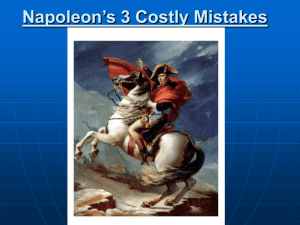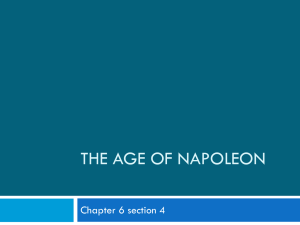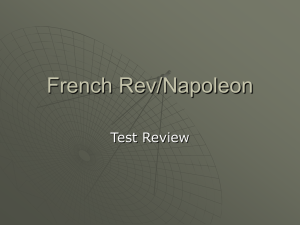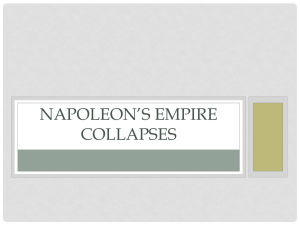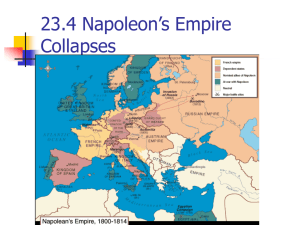NAPOLEON - the world of World History!
advertisement
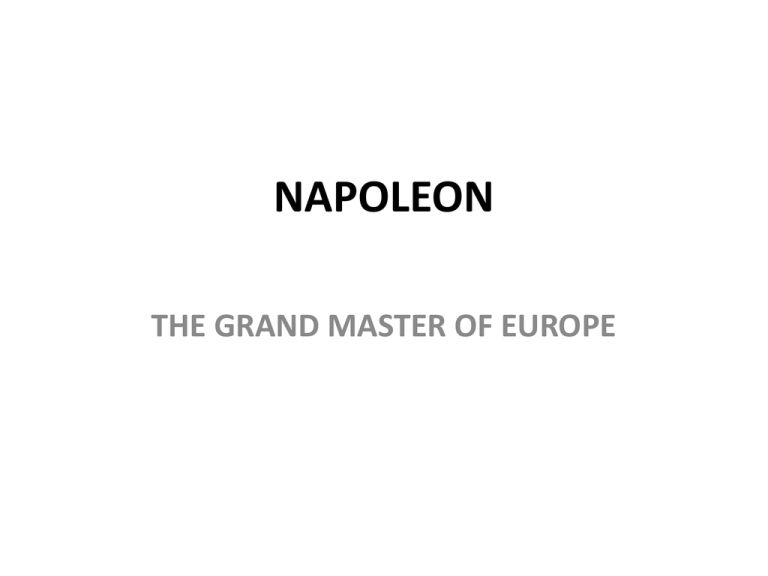
NAPOLEON THE GRAND MASTER OF EUROPE Rise of Napoleon • Napoleon Bonaparte was born in 1769 on Corsica (Italian island annexed by France) • Brilliant military leader who achieved numerous early successes and rose quickly through the ranks • Used his status as a national hero to seize power – 1799 coup d’etat led by General Napoleon brought an end to the Directory • The French craved the order and stability that Napoleon promised and were willing to give up some freedoms for peace, prosperity, and glory – The pope comes to crown Napoleon as emperor • Napoleon puts the crown on his own head – he took authority for himself • “I am the Revolution” Domestic Policies • Wants to end the hostility from the Revolution • Codification of the laws – prior to the Revolution France had 300 different legal systems – Known as the Napoleonic Code or Civil Code – Made laws uniform across the nation – Limits some individual rights, such as freedom of the press, and only applied to male citizens Napoleon’s Empire • Wants to rule Europe – Sells the Louisiana Territory to the U.S. to get money to fight his wars • the Napoleonic Wars were a series of wars that were an extension of the ones fought between France and other nations during the Revolution • 1807 – 1812 Napoleon is the master of Europe • Grand Empire – French Empire • Enlarged France, territories added on to France – Dependent States • Nations that Napoleon conquers, puts these kingdoms under the rule of his relatives • Spain, Holland, Kingdom of Italy, Swiss Republic, Grand Duchy of Warsaw, and Union of German states – Allied States • Defeats these nations in battle and forces them to ally with him against Britain • Prussia, Austria, Russia, Denmark, and Norway The only nations free of his control are Great Britain, Sweden, Portugal, and the Ottoman Empire Why Napoleon’s Empire Collapses • Great Britain’s survival – Geography, sea power of Britain • Napoleon tries to invade Britain, but his fleet his defeated by the British led by Admiral Nelson at the Battle of Trafalgar • This battle saves the British from invasion – Napoleon then institutes the Continental system – wants to stop British goods from reaching Europe • Britain depends on overseas trade and if the economy of Britain is weakened, then it would destroy their ability to wage war • Prohibits French or Allied ships from trading with Britain –The British respond by requiring ships from neutral nations to stop in British ports and not trade with France – leads to the war of 1812 between the British and the U.S. • Fails due to smugglers and Britain’s numerous colonies • Nationalism = a sense of identity and unity as a people – Spread principles of revolution and also nationalism to people conquered by the French – France showed people what nationalism was and what a nation in arms could do • Invasion of Russia – Russia refuses to remain in the continental system, so Napoleon invades – June 1812 Napoleon enters Russia with a Grand Army of over 600,000 men – needs a quick win • Problems – new recruits and many of the army’s supplies were lost or spoiled – Russian troops retreat hundreds of miles • The peasants also move east and burn their own villages, fields, and countryside – called scorched earth tactic – Napoleon finally reaches Moscow and finds it mostly deserted and in flames – lacked supplies and food – “Great Retreat” across Russia in horrible winter conditions • Starvation and freezing temperatures kill thousands and only 40,000 make it out in Jan. 1813 Downfall • First defeat and exile – Napoleon’s army is weakened, so Britain, Austria, Russia, and Prussia ally against France • Defeat Napoleon’s new army and in March of 1814 they capture Paris – Napoleon surrenders and gives up his throne • Gets to keep the title of emperor • The brother of the beheaded Louis XVI is made the new king of France – Napoleon is exiled to the island of Elba off the coast of Italy and is allowed 400 guards • Napoleon’s Return – The Hundred Days – Napoleon escapes and starts making his way back to Paris in early 1815 • Troops sent to capture him join him instead • The new king Louis XVIII flees • Napoleon arrives in Paris to cheering crowds – He raises a new army and starts to reconquer Europe and his enemies gather once again • This is known as the Hundred Days • Battle of Waterloo – June 18, 1815 – Final confrontation of Napoleon’s troops against British troops led by the Duke of Wellington – Napoleon is decisively defeated • Betrayals, hemorrhoids • Huge numbers of casualties on both sides – Napoleon flees to a port, but is soon captured • The second exile – This time the Napoleon is exiled to St. Helena, a volcanic island in the South Atlantic that is 1,200 miles from the nearest mainland – Napoleon dies there six years later
